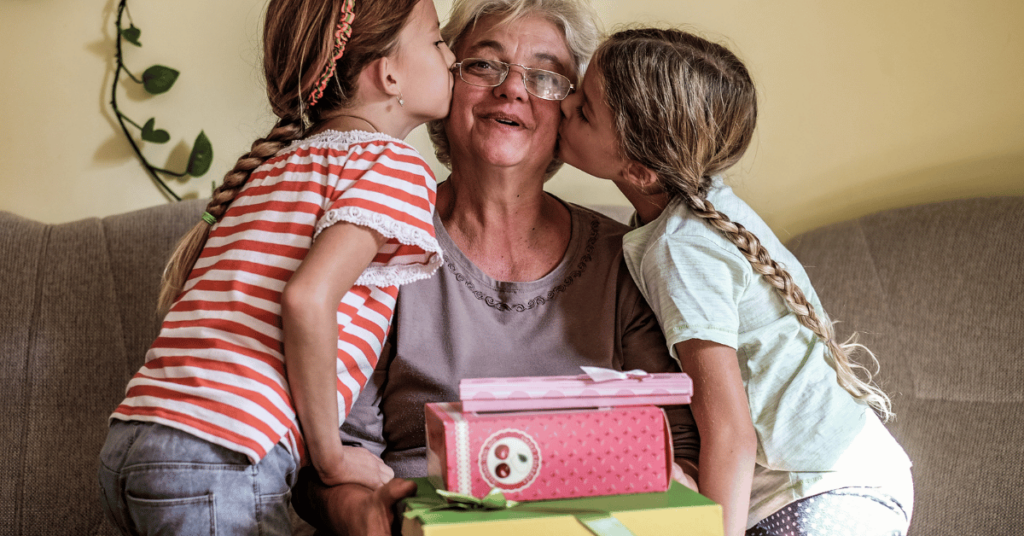In early 2023, I was asked by Epic Story Media to review the script for the cartoon “Luna, Chip, and Inkie: Hanging with Grammy Foot,” an episode dedicated to helping young children understand dementia. This experience reminded me of the importance of including children as young caregivers—not in the sense of taking on responsibility but in giving them the knowledge, tools, and confidence to stay connected with their loved ones.
Too often, adults try to shield children from difficult realities, assuming they are too young to understand. But children are incredibly perceptive, and when given the chance, they can respond with remarkable empathy and creativity.
How would you respond when you’re sitting with your child, watching them colour a picture for Grandma, and they suddenly ask, “Why does Grandma forget my name sometimes?”
It’s a moment that can catch any caregiver off guard. The instinct might be to protect children from the truth, to soften reality, or to change the subject. But children deserve honesty, and they are often far more capable of understanding than we often give them credit for.
Just as we teach them about kindness, patience, and change, we can also help them make sense of dementia in a way that fits their world. By doing so, we not only help them cope with the changes they see in their loved one, but we also give them an opportunity to strengthen their bond with their grandparents.
When children understand what’s happening, they can take an active role in making visits more meaningful—whether through a shared activity, a familiar song, or simply holding their grandparent’s hand.
Start with Simple Language
Use a comparison that fits their everyday experiences. You might say: “Grandma’s brain is like a big library, filled with books that hold all her memories. Your memories with Grandma are stored in one section, while my memories with her are in another. But sometimes, the lights in her library flicker or go out, making it harder for her to find and read those books. That’s why she might not always remember you or me—but the memories are still there, even if she can’t always see them.”
Reassure Without Sugarcoating
Often, children can sense when something is wrong, so honesty is key. However, how you frame it matters. Avoid saying, “Grandma is sick,” as young children might associate dementia with colds or fevers and expect her to get better. Instead, explain that dementia is something that makes a person’s memory and thinking change over time. For example:
“Grandma is still Grandma, but his memory doesn’t work the same way anymore. He might forget things or get confused, but he still loves you very much.“
If your child asks, “Will Grandma get better?” a truthful but comforting answer could be:
“Alzheimer’s disease is something that makes it harder for Grandma to remember things, and it won’t go away like a cold. But we can still help her feel happy and loved! Do you have any ideas on how we can do that?“
This not only reassures the child while gently setting realistic expectations but also gives them a chance to play a meaningful caregiving role for their grandparent. By having a better understanding of what’s happening, they can approach interactions with patience, kindness, and a sense of purpose.
Encourage Empathy & Patience
Children are naturally curious and often want to help. Encouraging them to be patient and kind will make visits with Grandma more enjoyable for both of them.
Remember that a person with dementia may not always be able to express themselves the way they used to, but they can still feel connection, kindness, and love. They can still experience joy.
While many types of dementia affect areas like the hippocampus and cortex, which are responsible for storing and retrieving information, the parts of the brain that process emotions—such as the amygdala—often remain strong for much longer. A warm smile, a gentle touch, or a shared moment—like listening to music or looking at pictures—can bring her comfort and happiness, even if she doesn’t remember why.
When children understand that they can still have a relationship with their loved one, even if it looks different, it eases their confusion and helps them feel included.
Create Positive Memories
Dementia changes a person, but it doesn’t erase love. Encourage children to continue sharing happy moments, even if those moments look a little different.
Sing songs together. Music is a powerful tool for connection and can awaken emotions even when words are lost.
Look through photo albums or watch home movies. Even if Grandma doesn’t remember every picture, the experience can spark joy and create a sense of warmth.
Do simple activities. Colouring, playing with soft toys (balloon toss works great!), or sharing a snack can offer comfort and connection in a way that words no longer can.
These small interactions remind children that their loved one is still present, even if her memory fades.
When visiting Grandma, don’t set the children aside in one room with their toys and devices. Instead, invite them to be part of the visit in a meaningful way. Encourage them to hold Grandma’s hand, share a story, or show her something they’ve made. Even if Grandma can’t say it, she likely appreciates these moments. Do not deprive her—or the children—of this connection. And never mistake silence for apathy. A person with dementia may struggle to express themselves, but they can still feel deeply.
Love and Connection Transcend Memory
Explaining dementia to a child isn’t about protecting them from the truth—it’s about giving them the understanding and tools to stay connected in a way that feels natural to them. Children deserve credit for their intelligence and capacity for empathy. When we give them the chance to be involved, they not only learn about dementia but also about patience, kindness, and the power of simply being present.
Even as memory fades, love remains. The emotions shared—the laughter, the warmth, the moments of quiet understanding—are far more powerful than the words forgotten. These experiences stay imprinted in the heart, long after names and faces slip away.
At Dementia Solutions, we’ve made it our mission to demystify dementia behaviour and continue to explore person-centred, creative, non-pharmacological solutions to manage dementia-related behaviours. We believe that awareness creation and skill-building through education is the most effective and powerful tool we have to promote and maintain the well-being of both the person with dementia and their caregiver.
If you’re a professional caregiver, consider becoming a Certified Dementia Care Provider!
Ready to deepen your understanding and be confident in your skills in managing changed behaviours due to dementia? Register for our Certified Dementia Care Provider program today and learn how to communicate with compassion, navigate challenging behaviours, and provide the best care for individuals living with dementia. Gain the tools you need to make a meaningful difference in the lives of those you care for. Sign up now and start transforming your caregiving approach!
If you’re a Family Caregiver, we invite you to join our Dementia Solutions Family Membership!
As a family caregiver, you don’t have to navigate the challenges of dementia alone. Join our Dementia Solutions Family Membership today and gain access to expert guidance, practical tips, and a supportive community of caregivers just like you. With resources, real stories, and valuable tools, we’re here to help you provide the best care while maintaining your well-being. Sign up now and take the next step toward confident, compassionate caregiving!
Any questions, simply send us an email at Info@DementiaSolutions.ca , and we’ll guide you through everything our programs have to offer. We look forward to helping you take the next step in your caregiving journey!
If you need support in your caregiving experience or would like to learn more about our educational opportunities, please reach out to us at Info@DementiaSolutions.ca and we would be more than happy to support you.
DISCLAIMER:
The contents of this blog are provided for information purposes only. They are not intended to replace clinical diagnosis or medical advice from a health professional.



